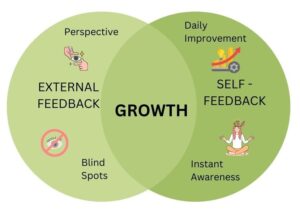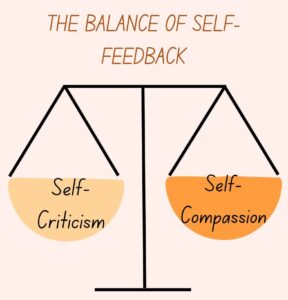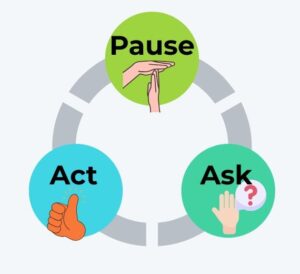
Have you ever replayed a meeting or a conversation long after it ended? Perhaps you asked yourself why you spoke in a certain way, or you felt proud of how you handled a tricky moment. That replay is not wasted energy. It is the earliest form of self-feedback, the voice that evaluates, encourages and sometimes warns you.
Most of us, however, treat feedback as something that must come from outside. We wait for managers, mentors, colleagues, or even family members to tell us what went right and what went wrong. The problem is that external feedback is often delayed, incomplete, or coloured by another person’s perspective. In contrast, the feedback you give yourself is immediate, honest and available every single day.
Self-feedback is not about tearing yourself down. It is about becoming your own coach, your own sounding board and your own growth partner. If you can master the art of giving feedback to yourself, you no longer need to wait for external validation to improve.
Think about how many professionals sit through annual reviews, hoping for guidance that will transform their careers.

A study published in Harvard Business Review revealed that employees crave feedback more than almost any other element of workplace culture. Yet most receive it far less often than they need. Managers often hesitate to give honest feedback, while others rush through it without context.
When you depend only on external feedback, you place your professional growth & leadership development in someone else’s hands. It is like waiting for a mirror to appear before you can check your reflection. You may end up doubting yourself, or worse, stagnating while you wait for someone else to comment.
Of course, external feedback matters. It gives you perspective and reveals blind spots. Many Corporate Training Programs are designed to bring in these outside perspectives, whether through roleplays, 360-degree feedback, or peer learning. But even the best external training works only if you continue the practice within yourself. Think of external feedback as dessert. It is sweet, enjoyable and adds variety. Self-feedback, on the other hand, is daily bread. It is what keeps you nourished and growing, regardless of who is watching.
Most people confuse self-feedback with self-reflection. Reflection is thinking about the past. Feedback is about what you can do differently in the present and future.
Self-feedback is an active coaching process. It is not about wallowing in mistakes or celebrating victories in silence. It is about asking, “What just happened? What can I learn from it? What will I do next time?”
Imagine it as a boardroom inside your head. There are three characters who sit at the table every time you evaluate yourself:
The Judge – the one who observes and analyses.
The Coach – the one who encourages and guides.
The Student – the one who listens and grows.
These three voices create balance. If you listen only to The Judge, you may become harsh and critical.
If you listen only to The Coach, you may ignore areas that need improvement.
If you forget The Student, you may never put learning into practice.
This balance is exactly what we aim for in behavioural skills training, leadership development programs, and emotional intelligence training. They emphasise awareness, self-regulation, and growth.
Self-feedback is the bridge that makes these trainings truly effective beyond the classroom.
Let us see how these three voices play out in real life.
Imagine you have just given a presentation at work. As you walk back to your desk, the voices in your head begin their meeting.
The Judge says, “You spoke clearly, but you rushed through the last part and lost the audience’s attention.”
The Coach follows, “That was still a strong attempt. Next time, slow down near the end and pause to emphasise your key points.”
The Student listens and notes, “Slow down at the end. Use pauses.”
 Now the feedback loop is complete. Without waiting for anyone else, you have already identified what went well, what needs improvement and what you will try next time.
Now the feedback loop is complete. Without waiting for anyone else, you have already identified what went well, what needs improvement and what you will try next time.
Psychologists call this process metacognition, or thinking about your thinking. Research shows that people who engage in metacognitive strategies learn faster and adapt more effectively. Self-feedback is essentially metacognition applied to performance.
This framework is not limited to big moments like presentations. You can use it after a team discussion, a conflict with a colleague, or even a personal task like cooking dinner. The Judge, Coach and Student are always available to you.
In fact, many organisations invest in Leadership Coaching for exactly this reason. Leaders must constantly self-correct in the moment because feedback from others often arrives too late. Leadership coaching usually involves an external coach who guides you to see yourself more clearly, helps you practice self-feedback and enables you to strengthen your ability to learn from your own experiences.
By combining leadership development with self-feedback, leaders sharpen their decision-making, communication and emotional intelligence long before a coach or manager weighs in.
Self-feedback is powerful, but like any tool, it can be misused. The biggest danger is turning it into relentless self-criticism. If your Judge becomes too loud, you may find yourself replaying mistakes endlessly without learning anything new.
Perfectionism is another trap. Research shows that perfectionists often struggle with self-talk that is harsh and unforgiving. Instead of using feedback to grow, they use it to punish themselves. This leads to anxiety and burnout.
There is also the risk of ignoring feedback altogether. Some people silence The Judge and The Student and listen only to The Coach. They become overconfident without seeing the gaps in their performance.
The key is balance. Healthy self-feedback should leave you with a sense of clarity, not despair. If your inner voice sounds more like a critic than a coach, it is time to retrain it. This is where Self Development Training and Personal Development practices prove invaluable, teaching individuals to replace harsh inner talk with constructive dialogue.
To make self-feedback a habit, you can use a simple three-step loop: Pause, Ask, Act.

Over time, these small loops create exponential growth. Psychologists call this deliberate practice, where focused adjustments compound into mastery.
For example, if you work on slowing down your speech at the end of each presentation, you will soon notice a dramatic improvement. That change then becomes part of your natural style.
James Clear, author of Atomic Habits, explains that small habits compound like interest. Self-feedback is the habit that compounds across every area of your life, from communication to leadership to personal relationships. It also multiplies the value of any Corporate Training Program you attend. Training gives you knowledge and skills, while self-feedback ensures those lessons become permanent.
External feedback is valuable, but it is not always available, and it is not always accurate. Self-feedback, however, is constant, immediate and deeply personal. It allows you to take charge of your own growth without waiting for permission.
The Judge helps you see clearly.
The Coach encourages you to move forward.
The Student ensures you learn and apply.
Together, they form the most reliable coaching team you will ever have.
If you learn to listen to them with balance and compassion, you will never feel lost in your journey of development.
The best coach you will ever have lives in your head. Feed that coach wisely. Let it guide you with honesty, kindness and vision.
External feedback may guide you, but self-feedback transforms you. When combined with leadership coaching and personal development practices, it becomes the daily bread that fuels lasting growth.
To know more about how The Yellow Spot can help you on your Learning journey, Visit ‘https://www.theyellowspot.com’ for more info or reach out at info@theyellowspot.com / India: +91 99677 14310, +91 87792 84314
#leadership skills # First Time Managers Training # corporate training # best corporate training companies #Pesonaleffectivenesstraining # softskillstraining #stressmanagementtraining


Blue Arch CHS, Louis School Lane, Four Bungalows, Andheri West, Mumbai – 400053